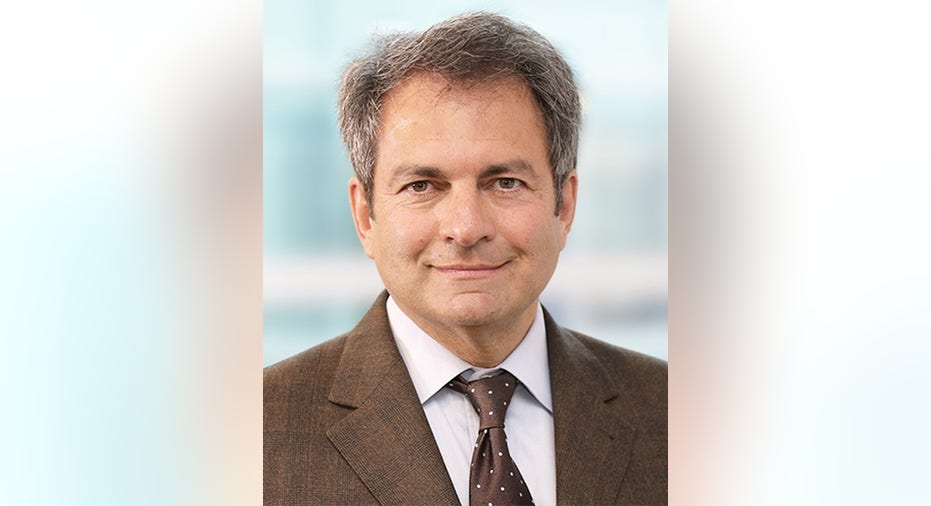Biogen's New CEO: Lots of Questions, Few Answers

Biogen (NASDAQ: BIIB) named MichelVounatsos as CEO on Dec. 19, 2016. Just a few weeks later, Vounatsos had his first moment to shine at the Goldman Sachs Healthcare CEOs Unscripted event held on Jan. 5, 2017. Biogen's new CEO was asked plenty of questions, but by my count, there were few real answers.
Image source: Getty Images.
A good start
Vounatsos got off to a good start, in my opinion. When asked about his main priorities for Biogen, he readily named several. At the top of the list was launching recently approved spinal muscular atrophy (SMA) drug Spinraza. With a huge potential for the drug, that should certainly be a high priority for Biogen.
The second-highest priority for Vounatsos was accelerating growth for Biogen's multiple sclerosis (MS) franchise. Another great answer. Biogen has six MS drugs on the market right now, but I think it's fair to say the thrill is gone. Sales for the company's interferon products are slipping. Tecfidera's sales are increasing -- but mainly because of price increases. Revenue from Tysabri in the third quarter of 2016 rose by only 7.5% over the prior-year period.
Vounatsos then ticked off a handful of other focus areas. He wants to simplify processes and enhance customer interaction. That sounds fine, although it won't exactly cause anyone's leg to tingle. He also mentioned accelerating enrollment for late-stage testing of experimental Alzheimer's disease drug aducanumab. Doing that could excite investors considering the reaction to Biogen's December announcement of encouraging results from an early-stage study of the drug.
I also thought Vounatsos had a great response to a question about what the biopharmaceutical industry can do to refocus discussion back to innovation and value. He pointed to the value Spinraza brings, stating: "A few months ago, there was no hope for [spinal muscular atrophy] patients. Today, there is hope." That's exactly the kind of message the industry needs to hammer home when critics attempt to shift the conversation to price alone.
But then...
Up to that point,Vounatsos was going strong. Then the conversation transitioned to details. Uh-oh.
When asked about how Biogen can maintain a reasonable balance with drug pricing, Vounatsos responded with fuzzy, boiler-plate language. "There's a long way to go," he said. Pricing is "delicate." Biogen "must be cautious" and "constantly evaluate different levels to be responsible" on pricing drugs.
Michel Vounatsos. Image source: Biogen.
The next question related to how far away value-based pricing is. Vounatsos replied, "It's not an easy transition." He added that Biogen isn't the "only actor on this approach," and that payers and pharmacy benefits managers need to be involved. All of this is true, of course, but none of it answered the question. (To be fair, Vounatsos did eventually say that the industry shouldn't wait too long.)
What about Biogen's capital allocation strategy? Vounatsos said superior shareholder return is a main goal. He also stated that the company has "a lot of capital and cash to use." But where Biogen might use that capital and cash remained unanswered.
Important stuff
Even though the Goldman Sachs analyst moderating the discussion probably felt like he was trying to nail Jello to the wall, I wasn't too concerned aboutVounatsos' vague and meandering responses to those questions. I just wanted to find out what Biogen's new CEO planned to do to reinvigorate its MS franchise and advance its Alzheimer's disease pipeline.
As I mentioned earlier, the company's current MS lineup isn't growing by an impressive rate from an overall perspective. What's worse is that Biogen's next MS drug, Ocrevus, could possibly have a negative net impact. Biogen licensed the commercialization rights to Roche (NASDAQOTH: RHHBY). Even though it stands to receive royalties, Biogen admits that Ocrevus could threaten sales of its other MS products.
Vounatsos was directly asked about Biogen's strategy for its MS franchise. He replied that the biotech has "a plan." Biogen is "on the offensive." What's the plan? How is Biogen on the offensive? Crickets.As for the looming threat from Roche, he said only that "a competitor is coming, but I hear it is delayed." (Roche recently announced that a U.S. regulatory decision has been pushed back to March 28, 2017.)
When asked about Biogen's plan to accelerate enrollment in the phase 3 study of Alzheimer's disease candidateaducanumab,Vounatsos mentioned two specific items. First, he said that accelerating enrollment was in the corporate scorecard. Second, he said Biogen intended to use social media.
Lesson from a country song
Michel Vounatsos is still new to the job. No one should expect him to reel off detailed answers to every question. For example, he was justified in responding that it's too early to know if Biogen will continue to emphasize a strong balance sheet like it did when George Scangos was CEO.
Still, I had hoped to gain a better understanding of what Biogen is going to do to remain competitive. I didn't get a warm and fuzzy feeling.
It's possible Vounatsos was being shrewd as a fox by answering with non-answers. There's an old country song with lyrics that state, "You say it best, when you say nothing at all." Michel Vounatsos, for the most part, said it best on Thursday.
10 stocks we like better than Biogen When investing geniuses David and Tom Gardner have a stock tip, it can pay to listen. After all, the newsletter they have run for over a decade, Motley Fool Stock Advisor, has tripled the market.*
David and Tom just revealed what they believe are the 10 best stocks for investors to buy right now...and Biogen wasn't one of them! That's right -- they think these 10 stocks are even better buys.
Click here to learn about these picks!
*Stock Advisor returns as of January 4, 2017.
Keith Speights has no position in any stocks mentioned. The Motley Fool owns shares of and recommends Biogen. The Motley Fool has a disclosure policy.



















